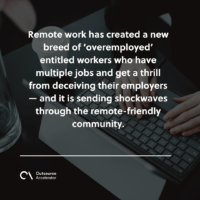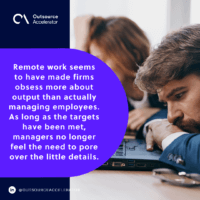Theft and deception
Remote work has created a new breed of ‘overemployed’ entitled workers who have multiple jobs and get a thrill from deceiving their employers — and it is sending shockwaves through the remote-friendly community.
These overemployed workers secretly work at least two full-time remote jobs simultaneously — a clear violation of corporate laws.
Davis Bell, CEO of tech firm Canopy who fired two engineers for lying to the company, declared that overemployment is “a new form of theft and deception, and not something in which an ethical, honest person would participate.”
This new trend has created serious repercussions for day-to-day business operations and has raised questions about how firms should manage their employees in this age of remote work.
Domino effect
Office workers saw their new remote work arrangements as an opportunity to increase their paychecks at least threefold without working more than a standard 40-hour workweek. What seems like a clever idea at face value has created a domino effect at the expense of the honest bunch.
Overemployed workers have confessed to exerting just the minimum effort to avoid taking on more responsibilities so they could focus on their other full-time jobs. This has disrupted workflows, pushing the non-overemployed to accomplish the deliverables of their double-dipping colleagues.
This is a bane for small and medium-sized enterprises that rely on a handful of employees to take the firm to the next level. With tight budgets and a small talent pool, SMEs need people who can fully commit to their day jobs.
The trend has been gaining momentum each day. A massive Reddit thread and a dedicated website have everything and anything about the unethical trade of overemployment. Double dippers share tips on how not to get caught, including the tools they use and various tricks they employ.
Return to core
Corporations’ responses have been tyrannical at best. Businesses have been using various tools to track productivity to catch the overemployed, including screen and time monitoring software.
Remote work seems to have made firms obsess more about output than actually managing employees. As long as the targets have been met, managers no longer feel the need to pore over the little details.
The behavior has led to a devolution of management, and employees have found gaping holes and abused them. Instead of enforcing firmer practices, firms have resorted to lazy ways to quantify productivity.
The principles of management, which hinge on trust and accountability, seem to have been thrown out the window when in fact, they should be integrated deeper into a business’s mission and vision.
The evolution of work calls for closer collaboration and oversight among employees, managers, and the C-suite. Amid the more flexible and results-oriented approach to work, bosses should reiterate the commercial and social contract between them and their employees.
This can be done through regular meetings centered around project progress, updates about the company, or even employees’ short-term career goals. This way, firms have employers and employees foster a healthy professional relationship.
It’s also a way to let the employees know that while remote work has given them relative freedom, the bosses are still watching over them. Thus, employees remain honest in their work practices and are constantly reminded of their ethical duties to the company.
The question for your business
How are you managing your employees?





 Independent
Independent





















